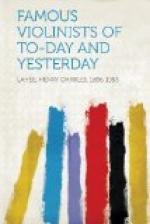Wieniawski’s tour in America, which took place in 1872, when he accompanied Rubinstein, may be said to mark an era in the musical life of this nation. These two great artists revealed the possibilities of the musical art to a people who, while loving music, were still in their infancy as far as musical development is concerned.
Wieniawski, like nearly all the great performers, showed his talent while very young. He was born in 1835 at Lublin, in Poland, where his father was a medical man. He was taken to Paris by his mother when he was only eight years old, and he entered the Conservatoire, where he soon joined Massart’s class, and when only eleven gained the first prize for violin playing.
After this he made a concert tour in Poland and Russia, but soon returned to Paris to renew his studies, especially composition. In 1850 he went again on the road, and with his brother Joseph, a pianist, he gave concerts in most of the principal towns in the Netherlands, France, England, and Germany. In 1860 he was appointed solo violinist to the Emperor of Russia, and held that position for twelve years, residing chiefly at St. Petersburg.
It was at the conclusion of this engagement that he made his tour in the United States with Rubinstein, who was his intimate friend, and when the great pianist returned to Europe Wieniawski remained in America and succeeded in making a large fortune, travelling all over the country and creating a furore by his performances. This tour was cut short toward the end of 1874 by a telegram from Brussels offering him the position of professor of violin at the Conservatoire, during the illness of Vieuxtemps.
He remained in Brussels until 1877, when, Vieuxtemps becoming convalescent, Wieniawski set forth once more on his travels.
At this time his health was failing, and an incident took place at Berlin which is well worth recording. During a concert he was seized with a sudden spasm, and was compelled to stop in the middle of a concerto. Joachim was amongst the audience, and came to the rescue, taking up Wieniawski’s violin and finishing the programme, thus showing his friendship for the sufferer and earning the enthusiastic applause of an appreciative audience.
Notwithstanding his sufferings, Wieniawski continued his tour, but at Odessa he broke down altogether.
It has been stated that he died unknown and friendless in the hospital at Moscow, and was buried by public charity; but his son, Jules Wieniawski, has contradicted this, and states that he died in the house of the Countess of Meek, and was buried by the Czar Alexander III., of whom he was the friend as well as the favourite violinist.




